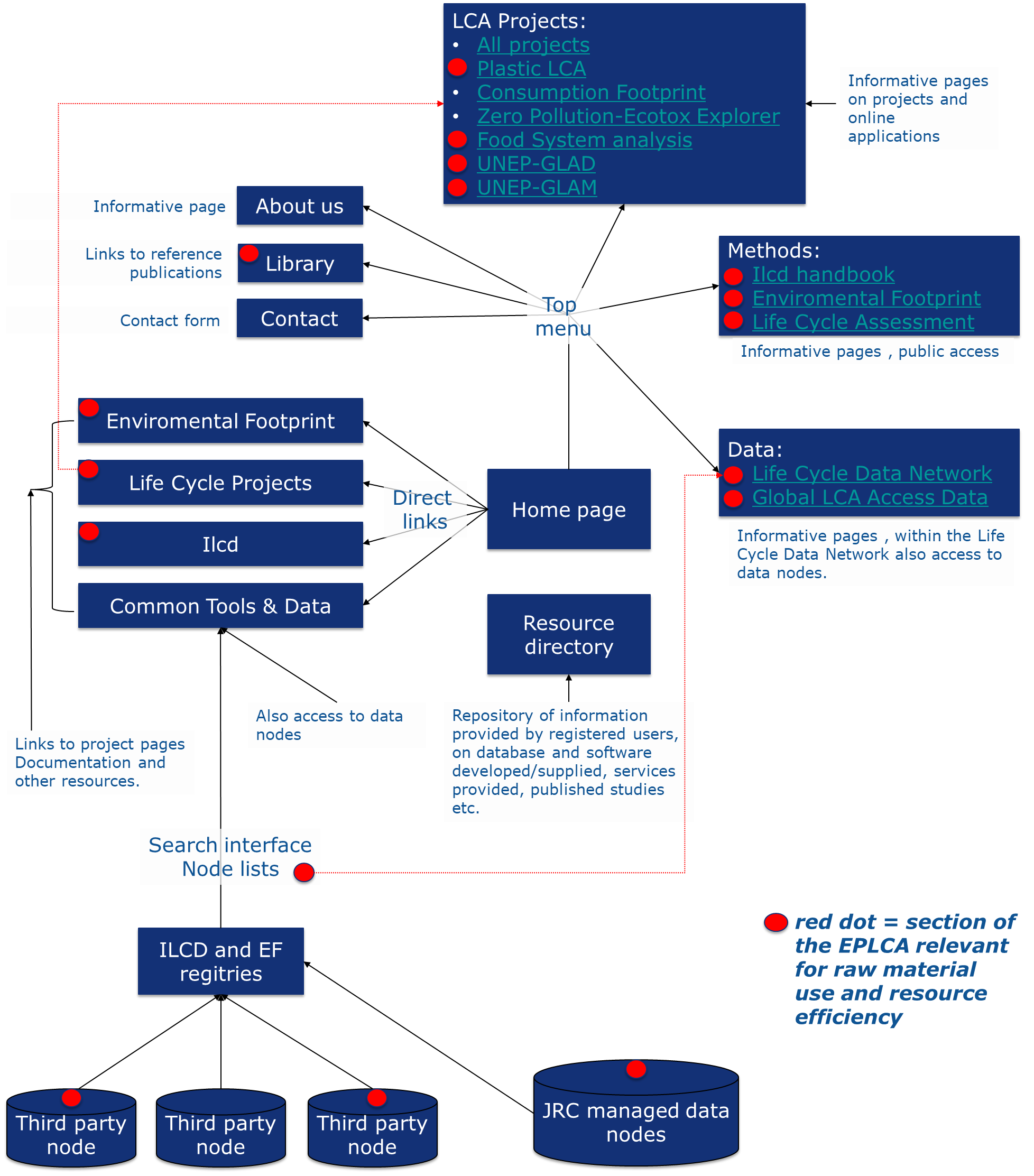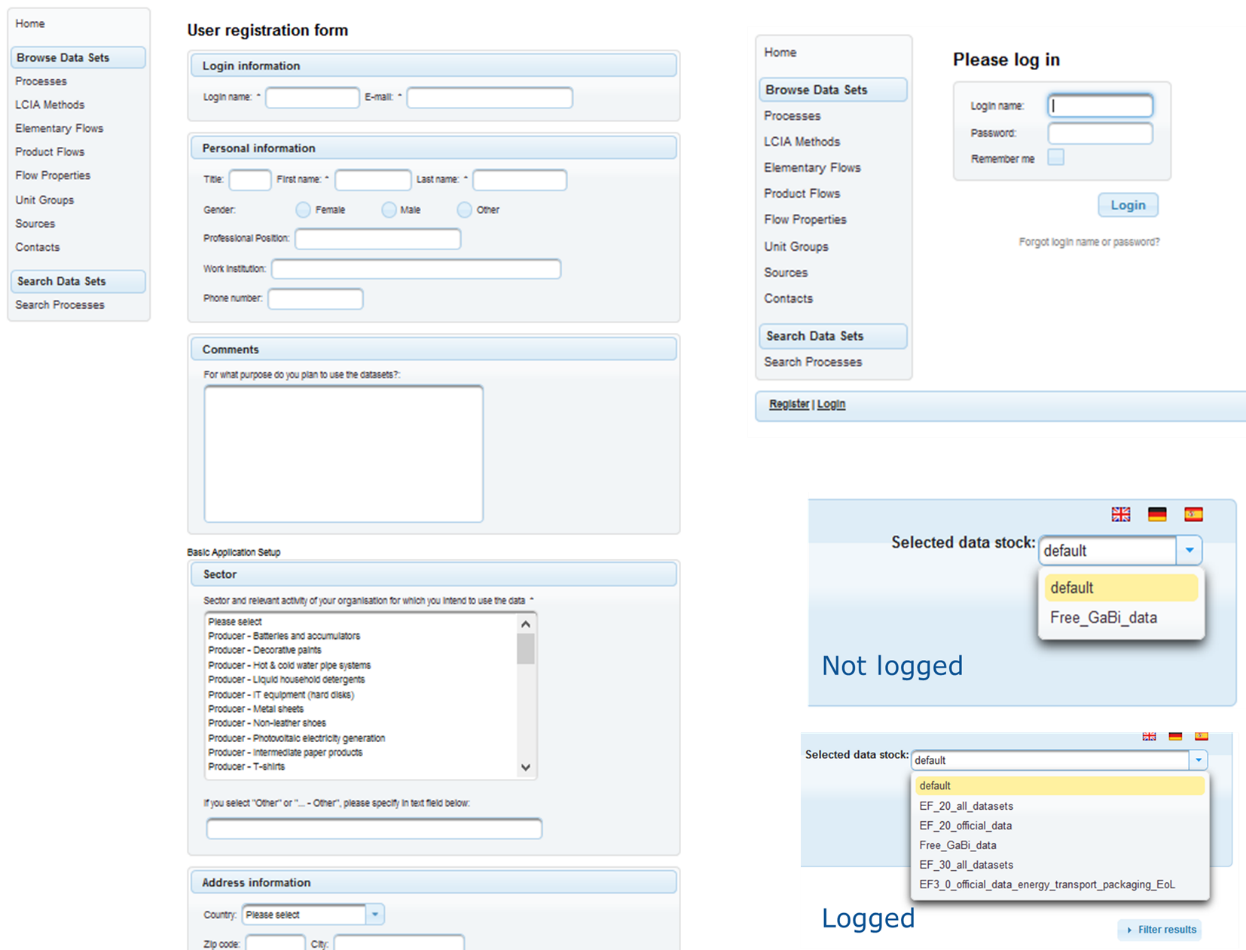
EPLCA
LCA, Environmental Footprint and Raw Materials
Life Cycle Assessment (LCA) is an internationally standardised approach for quantifying the environmental impacts attributable to specific goods and services.
Raw materials extraction, processing, transport, as well as e.g. recycling are all important steps in the supply chains that are assessed. Hence, LCAs model these supply chains, provide information related to emissions and resource consumption for each stage, and provide indicators related to environmental interactions of such chains for e.g. climate change.
Equally, LCA is the basis of the EC’s Product and Organisation Environmental Footprints (PEF/OEF).
All this information is supported by the European Platform on LCA (EPLCA).
EPLCA mission and aims
The European Commission's Integrated Product Policy Communication, since 2003, highlighted the necessity for a Platform on LCA (Life Cycle Assessment) to increase the availability of quality life-cycle data and methods. The EC, through its DG Environment and JRC, responded to these needs by establishing the European Platform on Life Cycle Assessment (EPLCA). The EPLCA was then mentioned and used as a reference in other policy documents.
The EPLCA aims at supporting the use of LCA into business and policies. Specifically for policies, the EPLCA is supporting the use of LCA in line with the European Commission Better Regulation Toolbox - method (#64) - for the impact assessment of policies.
The EPLCA fosters LCA as an essential integrated environmental assessment in support to the EU policy making process and the ambition of the European Green Deal, and many other policy initiatives, with specific reference to the Circular Economy Action Plan, the Farm2Fork, the Biodiversity Strategy and the Chemical strategy, and many more.
The EPLCA is articulated in several sections to respond to the different needs of scientists, business and policy makers for methods, data, studies and tools for quality LCA. The website represents a portal to several sections that includes access to data, methodologies, LCA-related projects, resources in LCA community (software and data developers, reviewers, etc.), and documents/reports.
EPLCA and the assessment of resources use in product’s value chain
Although the EPLCA is not directly focused on initiatives regarding raw materials, several sections have close interlinkage with aspects related to material resource efficiency, some of them are listed hereafter.
- The LCA methodology aims at capturing all the main environmental impacts related to a product/service life cycle, including impacts on resources. On such purpose, the EPLCA presents latest development of methods to account for the impact of resource use, and suggestions for the implementation of characterisation factors, normalisation factors and weighting for the different impact categories in the EU Product Environmental Footprint.
- The EPLCA contributes to the UN Global Guidance on Environmental Life Cycle Impact Assessment Indicators (GLAM) initiative, providing guidance on a distinct set of indicators including natural resources – mineral primary resources.
- The EPLCA contains a section for key JRC studies and ongoing activities related to application of LCA to different sectors. These studies include, among the other, the assessment of impacts on resource use due to consumption footprint of an average citizen, plastic products and food systems.
- The EPLCA Library is a repository of LCA studies as published by JRC in the last decade, including several publications concerning: impact assessment on resources; eco-design and resource efficiency; impacts of waste management and secondary raw materials production.
- The Life Cycle Data Network (LCDN) includes the so-called reference packages for ILCD (dated 2016) and the Environmental Footprint (EF) reference package . These packages prescribe the list of elementary flows to be used for the Life Cycle Inventory phase (including raw materials and resources used as input to the processed and to be accounted in LCA studies), and the list of impact assessment methods, including indicators on resource use. The nomenclature adopted in the flow list follows the rules for nomenclature and other conventions as defined in the ILCD handbook. The LCDN is also linked to two shared data systems. A list of nodes is available for EF data and for the ILCD Scheme.
The access conditions to the datasets in nodes is different, depending on different schemes and data providers.
The following figure illustrates the different sections of the EPLCA, the red dots identify the sections relevant (or potentially relevant) for the impact assessment of resources use.

Access the data
Follow the video below to access and browse data from the nodes (Specific example within the node of Sphera)
Steps:
- If the data stock that you are looking for is not publicly accessible for free, from the bottom left side of the node, register a user profile and then log in the node with the credential provided (the access can be for fee or for some specific users e.g. for EF data). If the data are available in the free data stocks go directly to step 2.
- Select the data stock from the top right menu. Once you are in the proper data stocks, you can browse the dataset from the “processes” section in the left bar menu or download the full zip package of the data stock selecting “download” from the top left link on the page, aside of the data stock name.
- Browse datasets in “process section”.
- Download full package (direct launch of the zip download).
- Selecting one single dataset from the process list leads to a process overview page, where some of the metadata are visible, and from where the full LCI dataset can be accessed online, downloaded as XML file, and in some nodes as a zip package, the last two can be used as exchange format to import datasets in software.
- The online version of the dataset gives access to different sections with different data, including the Life Cycle Inventory.
If you need to access restricted data: register and login to the node and browse the data stocks list (figure below)

